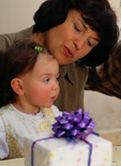
FRIDAY, Oct. 31, 2014 (HealthDay News) — Women who live with young children may be less likely to suffer hot flashes after going through surgical menopause, a new study suggests.
The finding, published recently in the journal Menopause, followed a small group of women who had their ovaries removed because they were at high genetic risk of ovarian cancer. Most of the women had already gone through menopause, but 48 had not — which meant the surgery caused an abrupt menopause.
In that group of women, those with a young child at home tended to have less severe hot flashes and night sweats, according to the study.
“This is a very interesting study that raises some important questions,” said Dr. Jill Rabin, an obstetrician/gynecologist who was not involved in the research.
One of those questions is whether the hormone oxytocin offers some protection from hot flashes, according to Rabin, co-chief of ambulatory care at North Shore-LIJ Health System in New Hyde Park, N.Y.
Oxytocin is commonly known as the “bonding hormone,” because it’s released during certain types of human connection — including when mothers breast-feed or care for young children.
But, like other hormones, oxytocin is “not just a one-job molecule,” said study co-author Virginia Vitzthum, a professor of anthropology at Indiana University, in Bloomington.
She explained that oxytocin also helps regulate the body’s core temperature — which, in theory, could be one reason why the women in the study who lived with children tended to have fewer hot flashes.
But this study doesn’t prove oxytocin deserves the credit.
“It just hints at that,” Vitzthum said.
Women who live with young kids might have other factors in their lives that help protect against more severe hot flashes, according to Vitzthum.
To name a few, differences in exercise, diet, job activities or stress levels could be at work, she said. And her team was not able to account for racial or ethnic differences, since most women in the study were white.
Vitzthum said the idea for the study stemmed, in part, from research on cultural differences in menopausal symptoms.
Women in some non-industrialized societies report far fewer hot flashes, versus those in industrialized countries. There could be any number of reasons, but one possibility is that family structure plays a role, Vitzthum said.
“Inter-generational living is very common in those cultures,” she said. Grandmothers or aunts are often under the same roof as young children, and share the responsibility for caring for them.
In the United States, Vitzthum noted, the “nuclear family” is now the norm. “But certainly through most of human history, the extended family was very common,” she said.
According to Vitzthum, it’s possible that humans evolved so that it’s not only children who benefit from those family relationships — but older family members, as well.
The current study included 117 women, all from the Seattle area, who had surgery to remove their ovaries because they carried gene mutations that raised their cancer risk. Sixty-nine women had already gone through menopause, while the remainder had not.
About half of the women had a child at home — either their own or a grandchild.
In general, the study found that women who were pre-menopausal before surgery tended to report less severe hot flashes after surgery if they lived with a child younger than 13.
Rabin agreed that oxytocin is only a theoretical explanation for the finding: “One issue is that [the researchers] didn’t actually measure the women’s oxytocin levels,” she said.
But Rabin said the possible connection is worth further research — including studies that follow women as they go through natural menopause.
According to Vitzthum, that research could take many directions. “For example, we don’t think the young child would have to be genetically related to you,” she said.
It’s possible, she speculated, that being around young kids — through volunteering, or helping to care for friends’ children or grandchildren — could help soothe hot flashes.
Another question is whether other types of relationships could affect hot flash severity, Vitzthum said.
Physical contact, including hugs, helps release oxytocin. And in some of those cultures where hot flashes are less common, older women are not shy about physical contact with each other, Vitzthum said.
“They hug each other, lean on each other, put a head on someone else’s shoulder,” she noted. Whether that helps cool hot flashes is unknown — but, Vitzthum said, “cuddling is just good.”
More information
Learn more about menopause symptoms and treatments from the U.S. Office on Women’s Health.
Copyright © 2026 HealthDay. All rights reserved.

